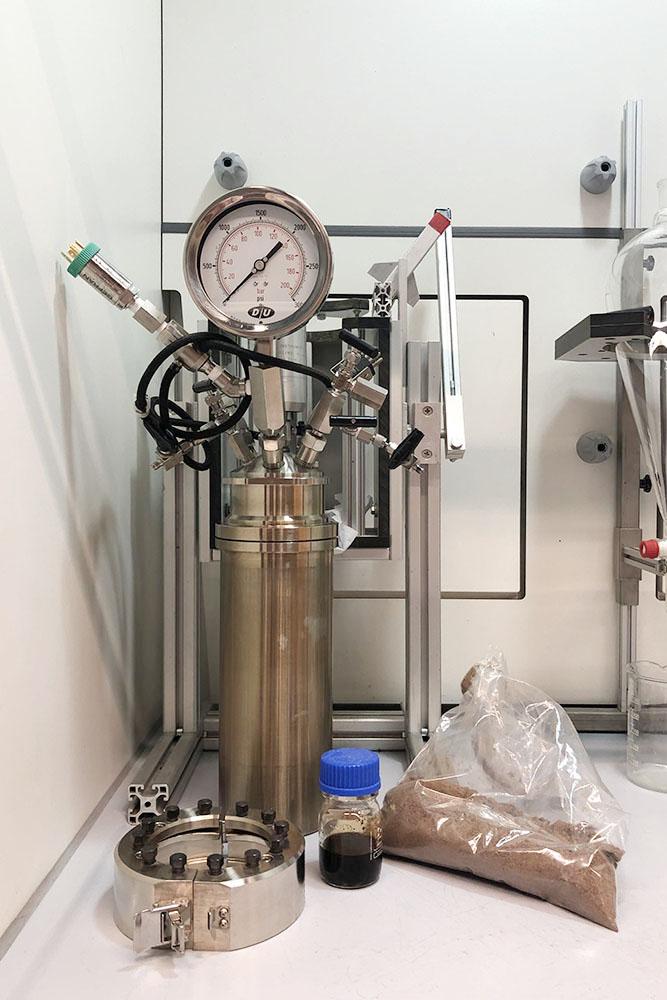An interdisciplinary team of bio-engineers and economists from KU Leuven has mapped out how wood could replace petroleum in the chemical industry

Credit: KU Leuven
An interdisciplinary team of bio-engineers and economists from KU Leuven has mapped out how wood could replace petroleum in the chemical industry. They not only looked at the technological requirements, but also whether that scenario would be financially viable. A shift from petroleum to wood would lead to a reduction in CO2 emissions, the researchers state in Science.
Our plastics, cleaning agents and building materials are usually made from chemical components derived from petroleum, rather than from renewable materials. Petroleum is currently cheaper to use as a raw material. But that doesn’t have to be the case. The team of researchers previously published on how wood can be transformed into chemicals that can be used in a plethora of products. That process has now been fully mapped out. Moreover, they calculated that it can be financially feasible to build and run a biorefinery that converts wood into chemical building blocks.
To extract chemicals from wood, it is first split into a solid paper pulp and a liquid lignin oil. The pulp can be used to produce second generation biofuels or natural insulation, while the lignin oil, like petroleum oil, can be further processed to manufacture chemical building blocks, such as phenol, propylene, and components to create ink. The lignin can also be used to make alternative building blocks for plastics. Chemical compounds based on lignin are less harmful to humans, compared to those made out of petroleum.
“In the paper industry, lignin is seen as a residual product and usually burned. That’s a pity, since just like petroleum, it can have many high quality uses if it can be properly separated from wood and the right chemical building blocks are extracted,” explains Professor Bert Sels of the Department of Microbial and Molecular Systems. As a result, wood could replace petroleum in the chemical industry.
The new publication is an important milestone in the team’s long-term research. “What’s so special about this study is that we calculated the economic viability of a switch from petroleum to wood,” says Bert Sels. To create a realistic scenario, the researchers joined forces with a Belgian-Japanese ink company. This is because certain compounds from lignin can be used to make ink. The calculations indicate that a chemical plant that uses wood as a raw material can be profitable after a few years.
CO2 storage
Through smart forest management, wood can be harvested sustainably. “Moreover, as a result of the shrinking paper industry, there is currently a surplus of wood in Europe”, Sels explains. The researchers are also collaborating with waste processors and landscape managers to use prunings and other waste wood.
The environmental cost of using wood would be smaller than when using petroleum, since chemical compounds made from wood cause less CO2 emissions. Moreover, products made from wood derivatives can store CO2, just like trees do. “As a result, it would be possible to store carbon from CO2 in plastics – preferably recyclable ones,” Sels said.
To demonstrate the application of their research, the team will now scale up the production process. The first test phase has already started. Ultimately, they want to create a wood biorefinery in Belgium. In the meantime, the researchers are in conversation with various business partners who can process the cellulose pulp and lignin oil in a variety of products.
“The chemical sector emits a lot of CO2 globally. A serious change is needed to achieve a carbon neutral chemistry,” says Bert Lagrain, Sustainable Chemistry Innovation Manager. “By scaling up our research project, we hope to get the industry on board.”
###
Contact
Bert Sels, Center for Sustainable Catalysis and Engineering, KU Leuven, phone: +32 16 32 15 93, e-mail: [email protected]
Bert Lagrain, Center for Sustainable Catalysis and Engineering, KU Leuven, phone: +32 16 32 16 27, mobile: +32 479 45 28 18, email: [email protected]
More information
The paper ‘A sustainable wood biorefinery for low-carbon footprint chemicals production’ by Yuhe Liao, Steven-Friso Koelewijn, Gil Van den Bossche, Joost Van Aelst, Sander Van den Bosch, Tom Renders, Kranti Navare, Thomas Nicolaï, Korneel Van Aelst , Maarten Maesen, Hironori Matsushima, Johan Thevelein, Karel Van Acker, Bert Lagrain, Danny Verboekend and Bert F. Sels was published in Science and is available upon request.
Interested journalists are welcome to visit the lab. Contact the KU Leuven Press Office: [email protected] or +32 16 32 40 08.
Media Contact
Bert Lagrain
[email protected]
32-479-452-818
Original Source
https:/
Related Journal Article
http://dx.




